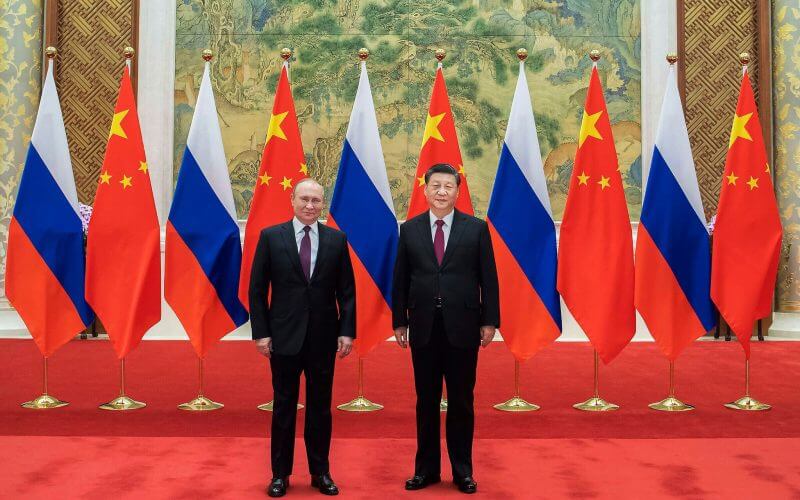In conjunction with the European Union, Canada, Australia, Japan, and the United Kingdom, the United States has imposed sanctions on several large Russian financial institutions tied to Russian President Vladimir Putin’s military incursion into Ukraine.
Some Russian banks have been banned from SWIFT—the Society for Worldwide Interbank Financial Telecommunication, the high security network that facilitates payments among 11,000 financial institutions in 200 countries—on Saturday.
In addition, sanctions have been placed on members of the Russian elite and their families.
The sanctions are targeted to hit Russia’s financial, energy, and transport sectors, and include export control and trade financing bans. However, these sanctions could have an unintended consequence: tying Russia even tighter to China.
By growing its economic alignment with Beijing, Moscow could potentially blunt the impact of Western sanctions. This could potentially give both China and Russia more leverage in disputes with the West.
China is already Russia’s largest trading partner, with 23 percent of Russia imports coming from China and 15 percent of its exports (mainly oil and gas) going to China. Chinese purchases of oil from Russia surpassed its purchases of Saudi Arabian oil in December.
Russia is also a major recipient of loans from Chinese financial institutions, receiving $151 billion between 2000 and 2017.
In the weeks preceding Russia’s invasion of Ukraine, Beijing both lifted restriction on wheat
imports from Russia and signed a 20-year deal to buy increased volumes of Russian gas.
Six days before the invasion began, Russia announced a yearlong deal to sell 100 million tons of coal to China, a contract worth more than $20 billion.
Hours before the bombing of Ukraine began, China agreed to purchase Russia wheat despite concerns about plant diseases.
Several energy deals Russia and China have recently signed are largely outside the U.S. dollar-based financial system, instead using the Chinese yuan.
These recent food and energy deals are just the latest signals of China’s economic alignment with Russia. A previous round of Western sanctions—a result of Russia’s annexation of Crimea in 2014—saw Russia signing a $400 billion deal to send gas to China and increasing cooperation around infrastructure and technology with China.
China’s growing focus on the possibility of conflict, with their military spending growing four times faster than other government spending, have begun to emphasize a greater reliance on Russia for crucial supplies.
The joint Chinese and Russia statement released by Beijing and Moscow on February 4, when Putin and Xi met before the opening ceremony of this year’s Olympic Games hosted in
Beijing, is said by Western officials to be effectively a Sio-Russian nonaggression pact, and this more robust relationship between the two countries seems to also be ushering in closer
economic cooperation.
If China chooses to assist Russia in circumventing Western sanctions, it could potentially result in greater political cooperation, as well as economic, which may pose a major problem from the West down the line.
Currently, China is remaining neutral in its stance towards Russia’s invasion of Ukraine.
While the Chinese government has claimed that it strongly supports “respecting and
safeguarding the sovereignty and territorial integrity of all countries,” to include Ukraine, it has stopped short of condemning Moscow’s actions, going so far as to criticize the sanctions imposed by the West on Russia and abstaining from a U.N. security council vote condemning the Russian invasion of Ukraine.
China currently seems unwilling to tie itself to Putin’s regime or to publicly help Russia
circumvent Western sanctions. Many Chinese State-owned banks may refrain from overt
violations of the sanctions placed upon Russia for fear of being shut out of the global financial system, as many Chinese banks still deeply rely upon the U.S. dollar. Chinese companies that circumvent sanctions rules could potentially face escalating punishment by the U.S., including civil and criminal penalties.
The Biden Administration’s export controls apply to goods produced in any country as long as they use U.S. technology. They could also be cut off from American technology and the financial system, both of which many Chinese companies rely upon.
A growing Russian economic dependence upon China could also potentially cause friction
between the two countries down the line due to Russian resentment. Moscow already takes
issue with being beholden to a country that was, at one point, its protege during Soviet times.
The greater economic dependence upon China, and the increasingly lopsided relationship that will develop, will likely only deepen this resentment.
Russia also shows discomfort with China’s growing presence in Central Asia, which Russia tends to acknowledge as its backyard.
While the two countries are growing economic ties and agree upon several foreign policy issues, especially directed towards the U.S., as demonstrated by their joint statement, most of their foreign policy alignments tend to adhere to a “make the U.S. look bad” dynamic.
In reality, many of their current policies, outside their growing, though not yet irreversible, trade agreements, simply do not align—for example, Russia’s expansionism contrasts heavily with the principle of national sovereignty that Chinese leaders regards as sacrosanct.
While greater economic ties have been made, there is still a great deal of wiggle room for China. Chinese leaders do not seem willing to tie themselves to Putin, instead weighing the costs and benefits of strategic economic relations with Russia.
If there is significant cost to the Chinese financial and economic sectors as a result of their relationship with Russia, they will likely recalculate their ties with Russia.










